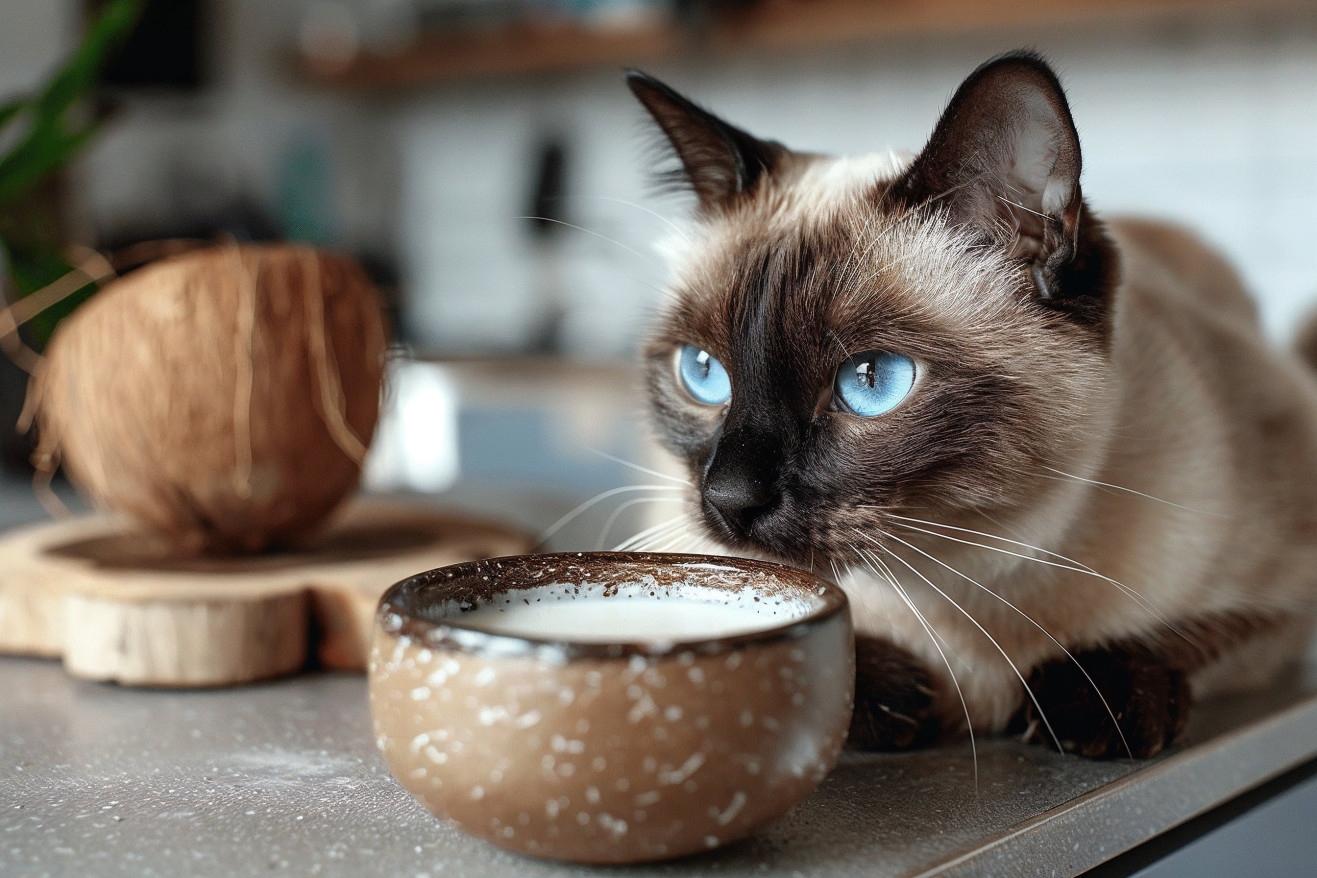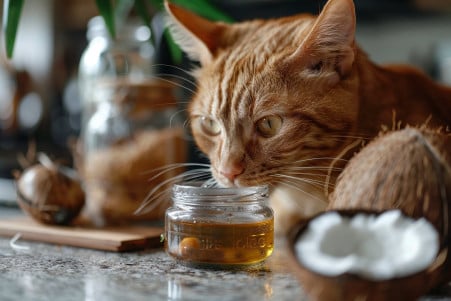Can Cats Have Coconut Milk? A Look at This Plant Milk for Felines
24 April 2024 • Updated 23 April 2024

If you have a cat, you know that their love of exploring may have led them to your glass of coconut milk at some point. But can you let them have a taste? While coconut milk is safe for cats to drink in small amounts and can even offer some nutritional benefits, it's important to note that it should not be used as a substitute for a well-balanced diet of cat food. You should also be aware of the potential side effects of feeding your cat coconut milk.
In this article, we'll take a closer look at the nutritional value of coconut milk and how it can impact your cat's health. We'll also discuss when and how to give your cat coconut milk based on information from veterinarians, scientific research, and anecdotal evidence. By the time you finish reading, you'll know whether coconut milk can be a healthy treat for your cat based on their individual needs and tastes.
Can cats have coconut milk?
Nutritional Value of Coconut Milk
Coconut milk is high in fat, with a large percentage of that fat being saturated. As The Spruce Pets explains, the medium chain triglycerides (MCTs) in coconuts are not safe for pets like cats in large amounts. It also contains a moderate amount of carbohydrates and natural sugars. However, coconut milk is low in protein and doesn’t have many of the essential nutrients that are necessary in a cat's diet.
Some coconut milk products may also contain added sugars, preservatives, or other ingredients that are toxic to cats. As Catster explains, even though coconut milk doesn’t have lactose, it is still hard for your cat to digest because it lacks the enzymes necessary to break down the plant proteins.
The high fat and calorie content in coconut milk can lead to obesity and other health problems in cats. As the ASPCA points out in Cattime's article, the high oil content in coconut milk can lead to diarrhea, upset stomach, and potential feline obesity problems if ingested regularly. The lack of essential nutrients and the high fat content mean that coconut milk is not a good regular food for cats.
Risks of Coconut Milk for Cats
Too much coconut milk can lead to obesity and the health problems that come with it, such as diabetes and joint issues. As noted by The Spruce Pets, the high fat content of coconut milk can also lead to digestive problems like vomiting, diarrhea, and pancreatitis in some cats. CatTime even suggests that coconut milk can lead to fatty liver disease or hyperlipidemia in cats.
Cats with preexisting health issues, such as kidney disease or inflammatory bowel disease, may be especially vulnerable to the negative effects of coconut milk. In addition, Petlife warns that kittens and senior cats may be more likely to experience complications due to their more delicate digestive systems. If you're thinking about giving your cat coconut milk as an occasional treat, it's important to do so in moderation and with the guidance of a vet.
Coconut Water and Coconut Oil: Better Options?
Coconut water is not recommended for cats because of its high potassium levels, which can cause hyperkalemia, or abnormally high potassium levels in the blood. As a result, Catster explains, hyperkalemia can cause symptoms such as weakness, collapse, and heart arrhythmias in cats.
While coconut oil may help with certain health issues in cats, such as skin and coat problems, it should be used with caution. According to The Spruce Pets, coconut oil is high in calories and can lead to weight gain if it's not carefully and properly added to a cat's diet. It's best to consult a vet before giving coconut oil to cats as a supplement, especially since some cats may be allergic to it and experience problems like pancreatitis.
Instead, PetMD explains that fish oil and olive oil that's applied topically may be better options for some cats. These alternatives can offer the same advantages as coconut oil without the calorie load.
Coconut Allergies in Cats
Coconut allergies in cats are rare but not unheard of. According to PetMD, symptoms of a food allergy in cats can manifest as skin problems, gastrointestinal upset, or respiratory distress. In addition, the New York Allergy and Sinus Centers states that symptoms of a coconut allergy in cats can be mild to severe and may include hives, itching, upset stomach, and anaphylaxis.
Coconut allergies are diagnosed through an elimination diet and observation of symptoms, says PetMD. The only treatment for a coconut allergy in cats is to avoid feeding them any products that contain coconut. According to Greg.app, continued exposure to coconut can cause chronic gastrointestinal issues, so it's important to see a vet if you think your cat has a food allergy or intolerance.
Other Options for Cats Instead of Coconut Milk
If your cat can't or shouldn't have coconut milk, there are plenty of other options. The Spruce Pets suggests using water or low-sodium broth to help keep your cat hydrated. Goat's milk or lactose-free cow's milk might also work for some cats in small amounts, according to Catster.
You can also try giving your cat a little unsweetened plant-based milk, like almond or oat milk. However, as CatTime points out, a well-balanced, complete commercial cat food is the most important part of a cat's diet.
Conclusion: Use Coconut Milk in Moderation
Coconut milk should be used as an occasional treat for cats, not as a regular part of their diet. Overconsumption of coconut milk can lead to obesity, gastrointestinal upset, and potential nutrient imbalances. There are no essential nutrients in coconut milk that can't be found in a balanced and complete commercial cat food.
Cat owners should talk to their veterinarian before adding coconut milk or other coconut products to their cat's diet. When giving cats coconut milk, it's important to use it in moderation and watch for any adverse reactions.


